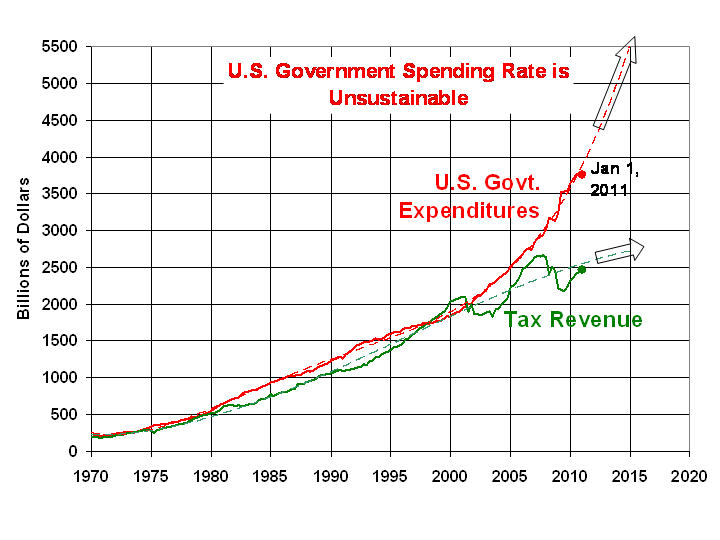 We are used to politicians having to compromise in Washington. Compromise is viewed as a good thing. Both sides get some of what they want. What our country is facing with the current budget crisis, however, is a totally different situation.
We are used to politicians having to compromise in Washington. Compromise is viewed as a good thing. Both sides get some of what they want. What our country is facing with the current budget crisis, however, is a totally different situation.
We are not discussing how much this constituency gets out of tax revenue versus that constituency. We are instead dealing with the very real possibility that our economy will collapse due to excessive levels of debt and overspending, at which point no one is going to get much of anything they want.
An Example from the Real World
Let’s say a large family has gotten in the habit of spending more than it earns, borrowing more and more each year to the point where they are now spending 40% more than they are earning (which is where the federal government is now).
The family has loaded up its credit cards, and even opened up new credit card accounts each year in order to pay off the interest owed on the previous cards, as well as to support their lavish spending.
To make matters worse, creditors are about to raise the interest rates on those credit cards because they see the family as a high risk for not being able to pay off their cards. As it is, the parents in this family already know their children will be inheriting the problem they have created, since it will take many years of sacrifice to fix the problem.
What should they do? Should the family keep on the current path? Or, should they start to reduce their rate of spending, rather than increase it year after year?
The husband and wife agree there is a problem, but disagree about what they should do. One wants to start decreasing their rate of spending, even if it is painful in the short run. But the other wants to continue spending more than they earn…after all, the rest of the family has grown accustomed to clamoring for more and more cash to support their lifestyle. It would be cruel to not allow them to continue as before.
On an Unsustainable Path
The following chart dramatically illustrates that the situation our country is in right now, and it is far worse than any financial situation we have ever experienced before (the data come from here). True, almost every year the U.S. Federal Government has run a budget deficit (spending more than it takes in), but the last few years have seen an astronomical growth in that deficit due to the housing bubble, multiple wars being fought, “stimulus” spending, and an increasing proportion of the population willing to just sit back and live off their neighbors’ tax dollars: (click for the full-size version)
The brake this puts on economic growth is now making the budget deficit even worse because the amount of tax revenue coming in is a “percent of the action”, and the “action” (economic activity) has slowed to a trickle.
Clearly, the path we are on is unsustainable. I fear we will soon find ourselves in the same situation as Argentina, whose unsustainable rate of borrowing finally culminated in what amounted to economic collapse around 2001. Much of the country was suddenly poverty stricken, with rampant crime as people were just trying to survive.
Banks either closed, or only allowed customers to withdraw very small amounts of cash each week. Inflation skyrocketed. Many of the ruling elite fled the country with great amounts of wealth, since they saw the crisis coming.
In a matter of a couple of years, Argentina became virtually a Third World country.
Unfortunately, just like the family that could not rein in its spending, so much of our population has become dependent on government handouts (which means, taking from those taxpayers who help keep our economy going) that it will be difficult for politicians to do what needs to be done to put us back on a path toward prosperity.
We must reduce wasteful spending, and we must reduce the governmental tax and regulatory burdens on businesses which are keeping those businesses from growing. Politicians must make tough decisions that will save the country without regard for whether they will be re-elected or not.
The problem cannot be fixed by “taxing the rich more” because (1) there is not nearly enough money there to fix the problem, and even more importantly, (2) unless there is at least some incentive for people to financially benefit in proportion to their good ideas, there is no motivation to take the risks involved in bringing new and better products and services to market. After all, most of those attempts fail, and people who want more of what “the rich” have, are not willing to share in the failures of those who tried and failed.
Remember, “the rich” have kept only a small fraction of the total wealth they have provided to our country in the form of a higher standard of living with innumerable products at reduced prices, along with the millions of jobs provided to bring those products to market.
We need to celebrate the rich, not demonize them.
We are now at a crossroads, and it is our way of life that is at stake. If you want to see what the future looks like, just look at surviving in Argentina.

 Home/Blog
Home/Blog




